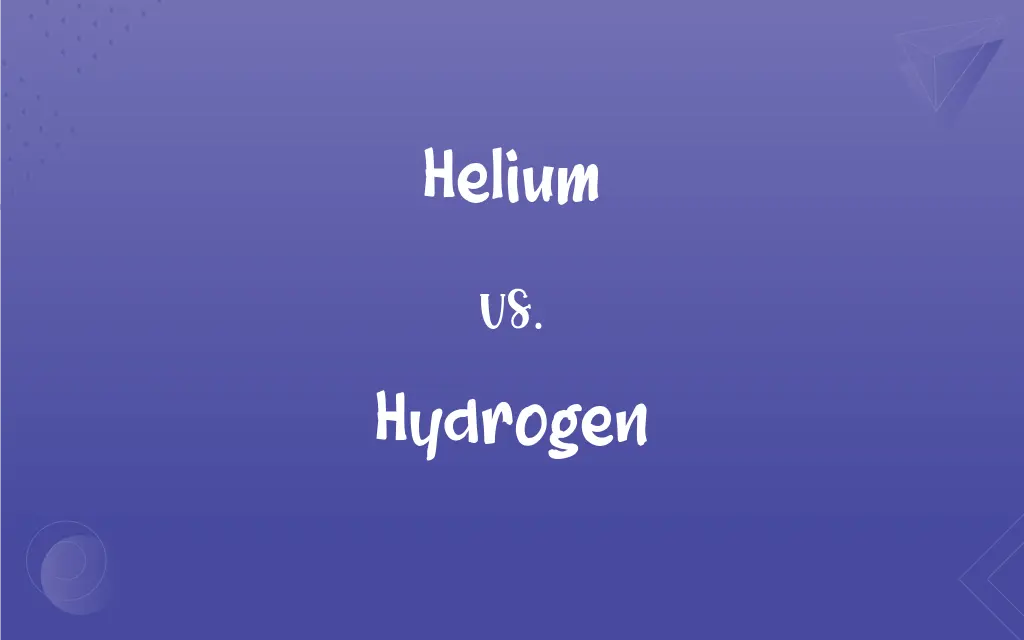Helium vs. Hydrogen: What's the Difference?
Edited by Aimie Carlson || By Janet White || Published on January 20, 2024
Helium is a noble gas with atomic number 2, inert and lighter than air, often used in balloons; hydrogen is the lightest element with atomic number 1, highly reactive and a primary component in water and organic compounds.

Key Differences
Helium has an atomic number of 2, with two protons and usually two neutrons, while hydrogen, the simplest element, has just one proton and typically no neutrons. Both have one electron shell, but helium's is completely filled, whereas hydrogen's is not.
Helium is a colorless, odorless, inert gas under standard conditions. Hydrogen, also colorless and odorless, is highly reactive and combines readily with other elements.
Helium is widely used in balloons, airships, and as a cooling medium in nuclear reactors and MRI machines. Hydrogen serves as a fuel source, in ammonia production, and is crucial in the petrochemical industry.
Being a noble gas, helium is chemically inert and rarely forms compounds. Hydrogen is highly reactive, forming compounds with most elements, and is a key player in acid-base reactions.
Helium is the second most abundant element in the universe, primarily found in stars and natural gas reserves on Earth. Hydrogen is the most abundant element, constituting roughly 75% of the universe's elemental mass, and is found in water, organic compounds, and as a gas in the atmosphere.
ADVERTISEMENT
Comparison Chart
Atomic Number
2
1
Physical State (at room temperature)
Gas
Gas
Chemical Reactivity
Inert, rarely forms compounds
Highly reactive, forms many compounds
Common Uses
Balloons, cooling in MRI machines
Fuel, ammonia production, petrochemicals
Abundance
Second most abundant in the universe
Most abundant element in the universe
ADVERTISEMENT
Helium and Hydrogen Definitions
Helium
Helium is non-toxic and non-flammable.
Helium is safe for use in children's balloons.
Hydrogen
It has an atomic number of 1.
Hydrogen is the first element on the periodic table.
Helium
It's used in cryogenics due to its low boiling point.
Liquid helium is essential for cooling superconducting magnets in MRI machines.
Hydrogen
It's the most abundant element in the universe.
Hydrogen fuels the sun's thermonuclear processes.
Helium
It has an atomic number of 2.
Helium is used in gas chromatography due to its inert nature.
Hydrogen
Hydrogen is highly reactive and forms many compounds.
Water is formed when hydrogen reacts with oxygen.
Helium
Helium is a colorless, inert noble gas.
Helium balloons float because helium is lighter than air.
Hydrogen
Hydrogen is used as a clean energy source.
Hydrogen-powered cars emit only water vapor.
Helium
Helium has the lowest melting and boiling points of all elements.
Helium remains a gas at extremely low temperatures where other gases liquefy.
Hydrogen
Hydrogen is the lightest and simplest chemical element.
Hydrogen gas is used in fuel cells to generate electricity.
Helium
A colorless, odorless inert gaseous element occurring in natural gas and with radioactive ores. It is used as a component of artificial atmospheres and laser media, as a refrigerant, as a lifting gas for balloons, and as a superfluid in cryogenic research. Atomic number 2; atomic weight 4.0026; boiling point -268.9°C; density at 0°C 0.1785 gram per liter. See Periodic Table.
FAQs
What is helium?
Helium is a colorless, odorless, inert gas, the second element on the periodic table.
What is hydrogen?
Hydrogen is the lightest and simplest chemical element, represented as the first element on the periodic table.
Can hydrogen be used as fuel?
Yes, hydrogen is used as a clean fuel in fuel cells and combustion engines.
Is helium reactive?
No, helium is a noble gas and is chemically inert, rarely forming compounds.
What makes hydrogen reactive?
Hydrogen has a single electron, making it eager to bond with other atoms to achieve a stable electron configuration.
Where is helium found naturally?
Helium is commonly found in natural gas reserves and is produced through the radioactive decay of elements like uranium.
Are there any dangers associated with hydrogen?
Hydrogen is highly flammable and explosive when mixed with air, requiring careful handling.
How is helium extracted?
Helium is extracted from natural gas through a process of cryogenic distillation.
What are the methods for producing hydrogen?
Hydrogen is produced through steam methane reforming, electrolysis of water, and other chemical processes.
Why is helium used in balloons?
Helium is lighter than air and non-flammable, making it ideal for balloons.
How is hydrogen found in nature?
Hydrogen is found in water, organic compounds, and as a free element in the Earth's atmosphere.
How does hydrogen contribute to environmental sustainability?
Hydrogen is a clean energy source, with water as its only by-product when used in fuel cells.
What is the significance of hydrogen in biology?
Hydrogen is a fundamental component of water and all organic molecules, essential for life.
What types of compounds does hydrogen form?
Hydrogen forms a wide variety of compounds, including water, hydrocarbons, and acids.
What are the safety concerns with helium?
Inhaling helium can cause asphyxiation due to oxygen displacement, but it is otherwise non-toxic and safe.
What is the role of helium in scientific research?
Helium is used in cryogenics, as a shielding gas in arc welding, and in particle accelerators.
What is the future potential of hydrogen energy?
Hydrogen has significant potential as a sustainable and clean energy source for the future.
Why doesn't helium form compounds easily?
Helium has a complete outer electron shell, making it energetically unfavorable to form chemical bonds.
Can helium be used in medical applications?
Yes, helium is used in respiratory treatments and as a coolant in MRI machines.
Is helium found in the human body?
Helium is not biologically active and is not found in the human body.
About Author
Written by
Janet WhiteJanet White has been an esteemed writer and blogger for Difference Wiki. Holding a Master's degree in Science and Medical Journalism from the prestigious Boston University, she has consistently demonstrated her expertise and passion for her field. When she's not immersed in her work, Janet relishes her time exercising, delving into a good book, and cherishing moments with friends and family.
Edited by
Aimie CarlsonAimie Carlson, holding a master's degree in English literature, is a fervent English language enthusiast. She lends her writing talents to Difference Wiki, a prominent website that specializes in comparisons, offering readers insightful analyses that both captivate and inform.






































































